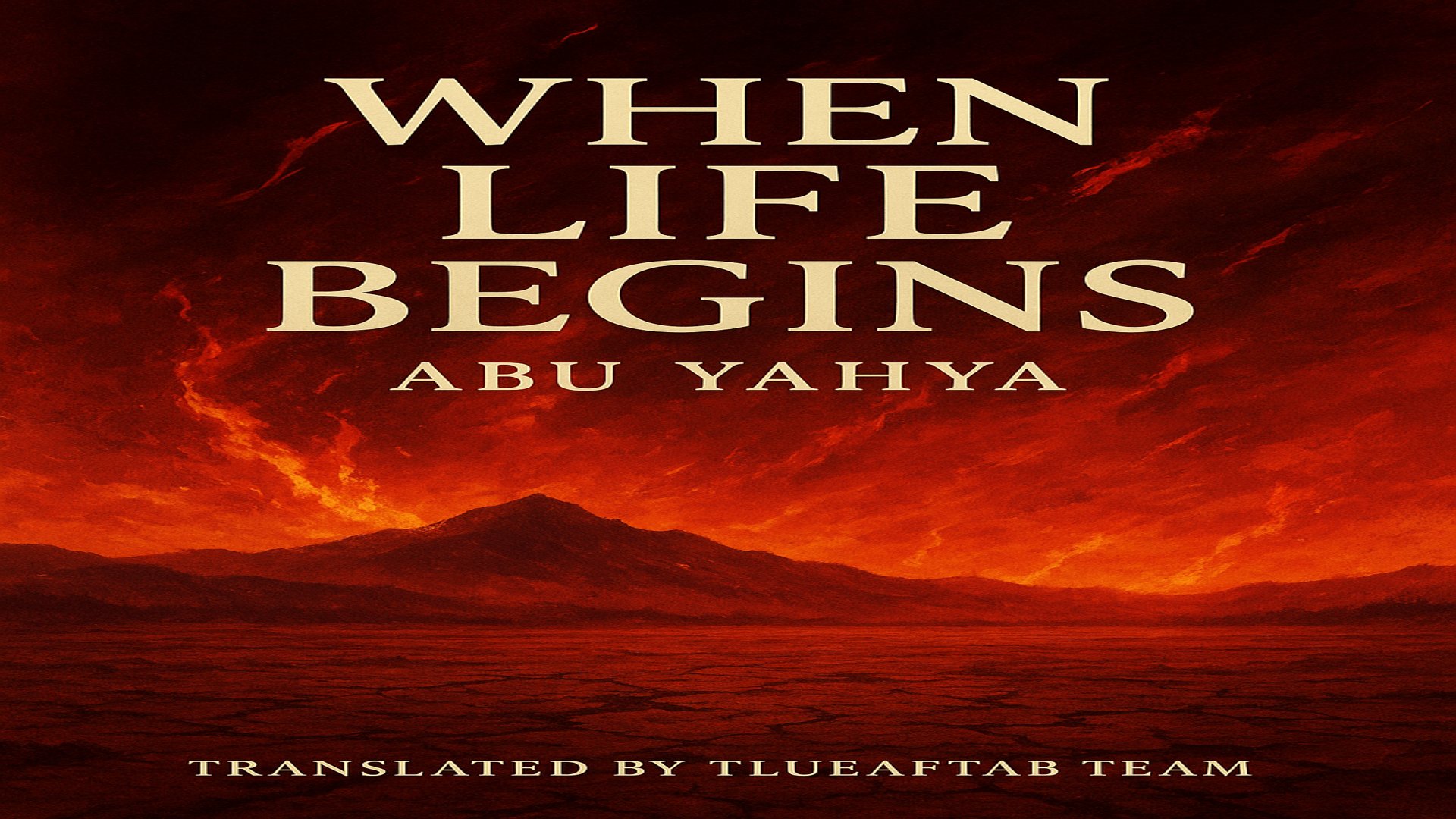Abu Yahya ( Translated By Tlue aftab Team)
The Companions of the Prophet ﷺ, the Muhajirun and the Ansar, were seated respectfully in a circle. A large number of the earliest and later members of the Ummah of Muhammad ﷺ were also present. The Prophet ﷺ, the lamp of guidance, sat among these moths of love and devotion, his head lowered. Outwardly, everything seemed fine, but I could sense the same concern spreading here as I had witnessed earlier. At that moment, the Messenger of Allah ﷺ was engaged in prayer before the Almighty.
“We should wait until the Messenger finishes his supplication,” Saleh whispered as he moved toward the back rows. We also sat down there. From that position, it was difficult to see what was happening at the front. I asked Saleh, “When will the reckoning begin?”
“How should I know? No one knows,” he replied. His answer left me silent. I leaned my head against the back of the seat and closed my eyes. I don’t know how much time had passed when Saleh’s voice reached my ears:
“Abdullah, get up! Look who has come to see you.”
Startled, I stood up. In front of me stood a dignified figure, his face glowing with a smile and his eyes radiating love. Before Saleh could say anything further, the noble person introduced himself in a gentle tone:
“Welcome, Abdullah! My name is Abu Bakr. On behalf of the Messenger of Allah ﷺ, I welcome you.”
As he extended both hands, I rushed forward and embraced him warmly. After our embrace, he led me to a seat a little away from the crowd. As soon as we sat, I asked eagerly, “When will I be able to meet the Messenger of Allah ﷺ?”
“The Messenger ﷺ is currently absorbed in gratitude and prayer before his Lord. You will meet him later. But right now, there is an important message for you. The supplication of the Prophet ﷺ has been accepted by Allah—that the reckoning should commence. And during that blessed moment of acceptance, you too had made a request: you wished to return to the plain of Resurrection and witness its conditions again. Your wish has been granted. The reckoning will begin shortly, but until then, you may observe the state of the people. It was for this very message that the Messenger ﷺ sent me to you.”
Hearing this, joy lit up my face, and seeing that, the smile on the face of the Khalifah of the Prophet ﷺ deepened. After a pause, he continued:
“Outside, the atmosphere is extremely harsh. Though Saleh will be with you, take this as well.”
He handed me a shimmering golden glass that was glowing with radiance. “This drink will protect you from the suffering outside.”
With both hands, I received the glass and lifted it to my lips. The moment the liquid touched my mouth, something extraordinary happened. I was neither thirsty nor restless, yet the satisfaction I felt was beyond description—something even the thirstiest person on earth could never experience upon drinking water. Every drop of that drink flowed from my tongue to my throat, from my chest to my stomach, filling every vein with serenity and delight. My heart longed to finish the glass in one gulp, but out of respect for the noble companion before me, I restrained myself. I asked softly, “What is this?”
“This is your first introduction to the new life and the new world. This is the Cup of Kawthar. After drinking it, neither the heat of the Resurrection nor thirst will trouble you.”
At once, I understood why it had such a profound effect. This was the water of Al-Kawthar, the river of Paradise, embodying all the qualities I had heard about throughout my life. And I realized that the pleasures of Paradise would be far beyond earthly experience. In the world, the delight of food and drink comes from two things: one, when hunger or thirst reaches its peak; two, when the food or drink itself is delicious. But in Paradise, every blessing would be inherently exquisite, and yet it would give the same satisfaction as if consumed in a state of dire hunger or thirst. There would be no hunger or thirst, no heaviness, no discomfort—only eternal pleasure.
We both began walking quickly. As soon as we left the boundaries of the Throne, an environment of intense heat and suffocation engulfed us. It seemed as if the sun had drawn to within a mile of the earth, blazing mercilessly. The air was still. People were drowning in sweat. There was no trace of water. Had I not drunk from the Cup of Kawthar, it would have been impossible to survive even a moment here.
But I could see countless people wandering in misery: their faces pale with fear, eyes filled with horror, bodies covered in dust and sweat, feet bleeding with blisters. It was a sight I had never seen before. Everywhere was chaos—people stumbling, crying, shouting, fighting, blaming one another.
My eyes searched for someone I knew, and suddenly I recognized my teacher, Farhan Ahmad. He noticed me too and hurriedly tried to avoid my gaze. “Stop him!” I pleaded with Saleh. “He is my teacher—I want to talk to him.”
But Saleh held me back. In a regretful tone, he said, “Abdullah, don’t add to your teacher’s disgrace. Whoever is humiliated here has been dealt with in full justice. He proved to be counterfeit on God’s scale of truth. That’s why he is in this condition.”
“But he taught us about faith, piety, and the Hereafter!” I protested.
Saleh replied indifferently, “Perhaps he did. But his knowledge never became his character. Remember, God does not judge by knowledge but by deeds and character. Knowledge is only meant to help build the right character. If the building is flawed, then knowledge is nothing but a snake. If it penetrates the heart, it becomes a friend. If it remains at the surface, it becomes poison.”
“That is what happened to your teacher. He was a fine writer, a good speaker, but his deeds and character did not match his words. In truth, he was nurturing snakes of knowledge, and today those snakes have bitten him.”
I stood stunned, unable to move. For me, my teacher was more than a guardian; he had been like a father—raising me, teaching me, even arranging my marriage. Seeing him in this state was a shock beyond words.
All around, chaos reigned: people screaming, cursing, blaming their leaders, their families, their parents and children. Some were striking their heads, others tearing their clothes, some beating their chests, some collapsing in despair. Each was trapped in their own misery. No one cared about anyone else.
As I remained in shock, Saleh leaned closer and said, “Abdullah, you came here to witness the conditions of Resurrection. Then prepare yourself, for there is worse to come. Among your family, your daughter Laila and your son Jamshed are also here in the same miserable state.”
The ground beneath my feet seemed to disappear. I collapsed, holding my head in despair, tears flowing uncontrollably. But in this vast crowd, no one cared. Each was consumed with their own fate.
“Now what will happen?” I asked with a trembling voice.
“Of course, the reckoning will begin. Only then will destinies be decided,” Saleh replied firmly. “Those who lived their lives preparing for this day—whether through fulfilling faith and morality, or serving the cause of God—were already destined for success. For them, death itself had been a certificate of salvation. Today, they are safe under the shade of the Throne. Their reckoning will only be formal, followed by the declaration of their eternal success.”
“And what about sins? Didn’t they commit sins too?” I asked.
“Yes,” Saleh answered. “But their minor sins were erased by their good deeds, and whenever they committed a major sin, they washed it away with the tears of repentance. Thus, they stand pure and forgiven. But those whose records contain crimes that destroy faith—such as disbelief, hypocrisy, murder, adultery, oppression, consuming the wealth of orphans, breaking God’s laws—such people’s sins will outweigh their faith. For them, Hell will be decreed.”
“And those in between?” I asked.
“Yes, there are many who had faith and some good deeds, but they continued sinning without repentance. Such people will suffer the torment of the Day of Resurrection for long years before there is any hope of salvation. Those you see suffering in this plain today are either criminals destined for Hell, or believers stained with sins, enduring this torment as the price of their misdeeds.”
Hearing this, I thought of how light sins seemed in the world, yet how heavy they had become today. Oh, if only people had not belittled their sins! If only they had made repentance a regular part of their lives, avoided gossip, slander, wastefulness, arrogance, and disobedience to Allah! If only they had clung to the Sunnah of the Messenger ﷺ! Then they would not be here today, where one fleeting moment of sin’s pleasure has turned into centuries of misery.
“Does anyone here know their final fate?” I asked.
“No,” Saleh replied gravely. “That is the greatest agony of this day. No one knows if they will be saved or not. Only Allah knows. That is why the Messenger of Allah ﷺ and other Prophets have been supplicating that the reckoning begin. Once it starts, the believers will finally be separated from the sinners. You know that today, no one is allowed to utter a word of defense. And the good news is, the supplication of the Messenger ﷺ has been accepted. Abu Bakr himself conveyed this to you. But the reckoning has not yet begun.”
“Why not?” I asked, bewildered.
“Because Allah, in His wisdom, will initiate it at the right moment. Perhaps all of humanity has not yet gathered here. Do you think people will arrive by planes, trains, or buses? No, everyone is coming on foot, driven by the blast of Israfil’s trumpet. Seas have been dried, mountains shattered. People are pouring straight into this plain. But walking takes time. The righteous, however, were brought here instantly by angels. Until the reckoning starts, let us continue to observe the state of these people. Perhaps that is why you have been allowed to come here again,” Saleh concluded, holding my hand and leading me forward…
✍🏻📜☜ To be continued…




